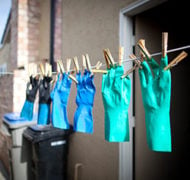The Work of an Illness
Blog / Produced by The High Calling
“Of course, you’ll want to ask me about complications,” Dr. Ellis said. “We have almost none from the procedures done by our doctors—and we have a 99 percent success rate with this type of surgery.”
I nodded, my mouth dry. Neck surgery? I wasn’t sure I was on board. Still, this surgeon was one of the best in the country, and God had gotten me in to see him in a miraculously short amount of time. If he recommended an invasive procedure to cure my now-constant, debilitating headaches, who was I to argue?
Tears streamed down my cheeks as I thought about all the things I’d tried in the twenty years since suffering a head-on car accident: acupuncture, chiropractic, massage, pain relievers, stretching, heat, ice, yoga.
It was time.
Two and a half weeks later—again, a miraculously short time with this physician’s schedule—I lay on a gurney in a paper gown, nervously waiting for my time in the operating room.
That was a month ago, and to be honest, recovery has not been easy. A skillful physician took his knife to my body, and the Great Physician took his scalpel to my heart. I’ve been surprised by how life-altering this “minor” surgery has been.
Because I’m in a neck brace, I’ve not been able to drive, do housework, or sleep in my own bed. In the process, I’ve discovered that I am very much a do-er (and not a be-er). It’s hard to admit, but I am not skilled at quieting my body and mind. I simply find more self-esteem in what I do than in who I am in Christ. And when I can’t do much, my emotions undulate.
When I did venture out, I noticed that people could be either curious or cruel, or both. First, I was amused, and then I felt frustrated at folks whose parents obviously never taught them that “staring is impolite.” The upside of this revelation? I now have much more empathy for people with visible and permanent disabilities.
Thankfully, the people closest to me displayed unending loyalty and selfless service. However, it was hard to be dependent. Just as I need to allow myself to feel loved by my Heavenly Father, I also need to get better at accepting love from the people God has placed in my life.
While I’ve been incapacitated, generous friends and relatives have brought meals, provided rides, and kept our family’s schedule humming along. In fact, they’ve enjoyed helping us. God has been driving home the point that sometimes it’s better to receive than to give. How can I truly depend on Him if I never learn to lean on others? Besides, surrender is just giving up control I never actually had.
Part of that surrender occurred before I went under the knife. As a nurse wheeled me into the OR, I succumbed to anesthesia, placing my trust in God and my surgeon. The next thing I remember, my husband was holding my hand. “It went well,” he said. “The damage was more extensive than Dr. Ellis expected, but he said it was a complete success.”
A few minutes later, my mother, father and sons joined us in my semi-private room. Dad patted my leg and asked, “How do you feel?”
How did I feel? Relieved, grateful—and surprisingly, pain free.
“I…I don’t have a headache,” I replied, and started crying. Only this time, they were tears of joy.
Image by Peter Kemmer. Used with permission. Sourced via Flickr. Post by High Calling Contributing Editor, Dena Dyer, author of the upcoming book, Wounded Women of the Bible, due to release in July 2013 by Kregel Publishers.





